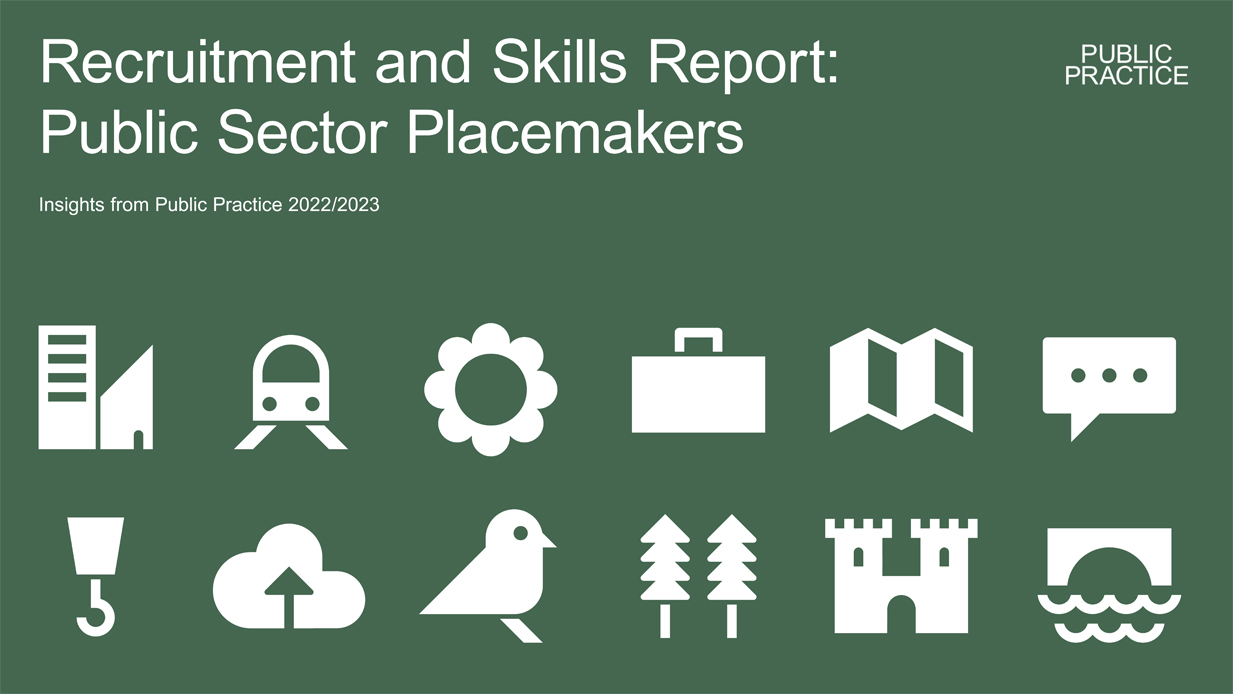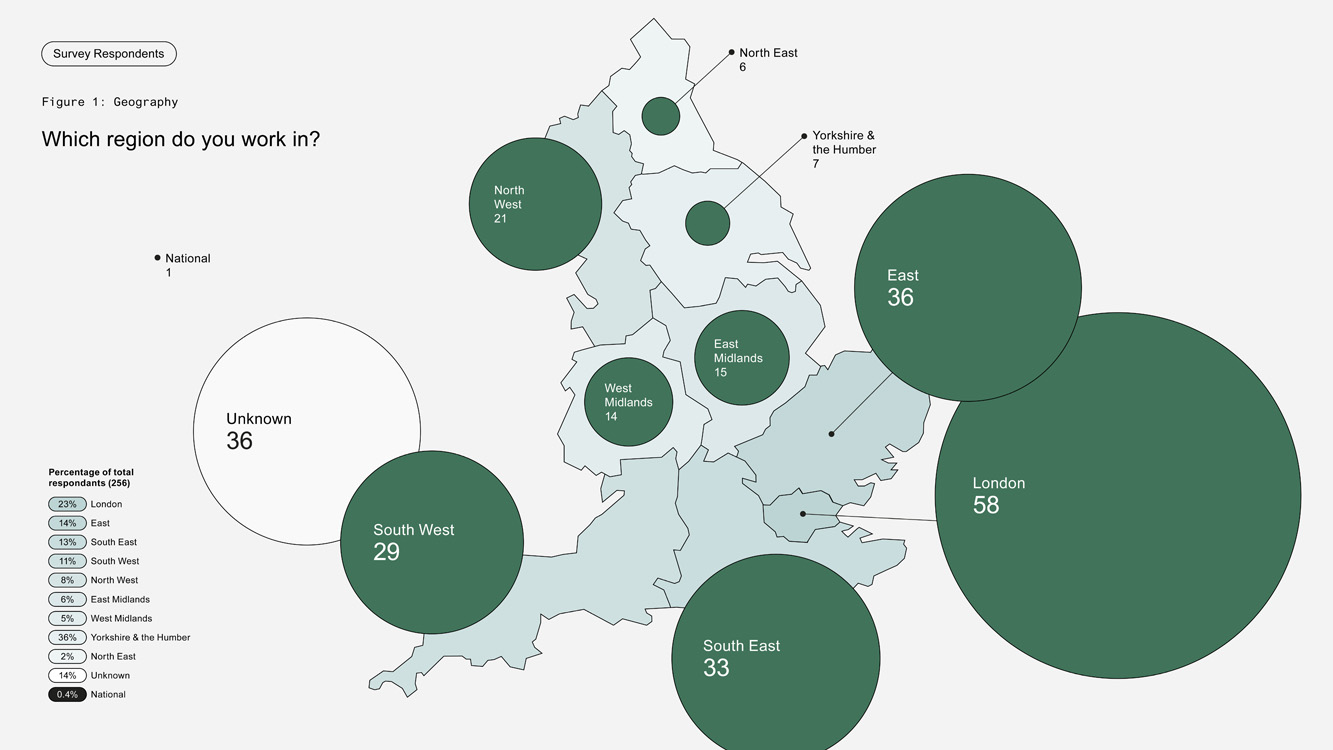
Two-thirds of local authority planning and placemaking professionals say their team does not have the capacity to meet their authority’s strategic objectives, according to a new survey.
The Recruitment and Skills Survey by not-for-profit social enterprise, Public Practice, has revealed that 66% of local government place professionals think their team does not have the necessary bandwidth and skills to tackle their authority’s top priorities.
While every local authority has different priorities, typical strategic objectives of authorities include aims like increasing opportunity and prosperity for residents, reducing inequality and poverty, and meeting targets to reach net zero.
The Recruitment and Skills Survey was designed by Public Practice to help understand the skills gaps and the impact that a lack of resources has on local authority placemaking professionals and their teams across England.
The survey responses appear to show that the morale and job satisfaction of placemaking professionals is being affected by the lack of capacity. More than half of respondents (54%) said their councils had difficulty retaining staff. And one in seven of those who answered (14%) said they want to leave the public sector.
The average job satisfaction score reported by a public sector place professional in England was 5.66 out of 10, down substantially from last year (6.32). This score is much lower than metrics recorded across the broader workforce, which on average report work satisfaction at between 7 and 8. In a global survey of more than 13,000 employees in 2020 74% of UK workers said they are very satisfied with their job.
The difficulty in retaining staff is reflected in the most recent local government workforce data which shows the number of full-time equivalent workers in local councils has plummeted by almost a third (32%) over the past decade.
The latest Local Government Association analysis of data published by the ONS shows the number of full-time positions in local government has fallen to 921,991 in Q4 of 2022 down from 1.34m in Q4 of 2012.
While the impact of Covid may have played a part the reduction in local government workers appears to show no signs of slowing as the number of full-time positions has fallen by 10% in 18 months from 1,024,400 in Q2 of 2021 to under 922,000 in Q4 of last year.
Local government capacity problems are further compounded as more than three-quarters of placemaking professionals (78%) said their council had difficulty attracting appropriately qualified or skilled candidates to fill the capacity gaps in their teams. Nearly a fifth of respondents (17%) said their recruitment activities failed to attract a suitable candidate further exacerbating capacity problems within local authority planning and placemaking teams.
 Public Practice was founded in 2017 with the mission of improving the quality, equality and sustainability of places for everyone by building the public sector’s capability to shape places for the better.
Public Practice was founded in 2017 with the mission of improving the quality, equality and sustainability of places for everyone by building the public sector’s capability to shape places for the better.
It runs an Associate Programme which supports the public sector’s placemaking capabilities by recruiting skilled candidates to year-long placements within local authorities. The programme is supported by a unique learning and development course, with the opportunity to join a cohort of like-minded professionals.
As local authorities struggle to attract and retain staff, over the past five years, Public Practice has attracted more than 2,700 professionals to apply to its placement programme, with more than 90% of them working in the private sector at the time of application.
Public Practice recently conducted a survey with the first four cohorts who took part in The Associate Programme. These Associates were employed in their placements between Spring 2018 to Spring 2020.
The data from this survey showed that two years after placements had ended, Public Practice has achieved a 77% retention rate in the public sector. To date, Public Practice has placed 296 placemaking professionals in 78 local authorities across England.
In response to the Recruitment and Skills survey almost two-thirds of local authority placemaking professionals (65%) said their team did not have enough skills in environmental sustainability, 62% said their team did not possess enough data and digital skills, and 61% said their team lacked sufficient Architecture, Urban Design & Masterplanning capacity.
More than two-fifths of placemaking professionals (43%) said their team had a lack of capacity in planning and policy.
Concerns were also raised about the diversity of local authority placemaking teams. More than two-fifths of respondents thought their team is not currently an accurate reflection of the diversity of the population that they serve.
Victoria Hills, Chief Executive of the Royal Town Planning Institute said: “The results of this research reveal a concerning reality for local authorities, but provide an accurate depiction of what we are seeing in our own research. On the ground, Local Planning Authorities struggling under the weight of budget reductions, resulting in unmanageable workloads and overstretched staff.
“Without well-resourced, qualified planners, Local Planning Authorities cannot meet the crucial housing and infrastructure needs of our communities. Whilst we welcome recent announcements on the planning skills delivery fund, we must urgently address the systemic resourcing issues to safeguard both our economy and the well-being of planners.”
In July the Department for Levelling Up, Housing and Communities developed a new capacity and capability programme, to help local authorities deliver a more efficient planning service.
To tackle the current demands on the planning system DLUHC has launched a new £24m Planning Skills Delivery Fund. This funding will support local authorities over the next two years to tackle backlogs in planning applications and boost their internal capacity and capabilities.
The department also awarded the social enterprise Public Practice £1m to help local authorities recruit and develop skilled planners, and increase awareness about careers in local government.
Rob Perrins, Chief Executive of Berkeley Group, commented: “Local authority planning teams are the gateway to investment in local communities and have a hugely positive impact on people’s health, wellbeing and life chances. But these departments are deeply under-resourced and, through no fault of their own, are struggling to fulfil the demands of an increasingly complex and prescriptive planning system.
“Local authorities must be given the secure long-term funding they need to expand these expert teams so they can create great places and unlock the investment, regeneration and growth our town and cities so badly need.”
Sara Whelan, Assistant Director of Planning at Dacorum Borough Council, said: “This survey paints an accurate picture of the challenges council teams face. We need to have an honest conversation about why job satisfaction is low in council place teams.
“Planning is about placemaking and should not be seen as a barrier, this is likely to have an impact on morale and job satisfaction as much as resourcing and backlogs will do. For example, research shows that more than 90% of planning enforcement teams have a backlog — this will naturally have a negative impact on job satisfaction as planning teams are on the backfoot as a result.
“To reduce the backlog councils, need to consider all options including temporary increases in hours and pay to help teams reduce the backlog.
“Local authority planning is a brilliant career and gives you an opportunity to make a positive difference to people’s lives in a way that few other jobs can.”
 Sally Herbert, Service Manager in Engineering Consultancy Services at Newcastle City Council has 15 years’ experience in local government working across placemaking services including transport, planning, and environmental services. sally commented: “We have to be open and honest about the challenges that we face.
Sally Herbert, Service Manager in Engineering Consultancy Services at Newcastle City Council has 15 years’ experience in local government working across placemaking services including transport, planning, and environmental services. sally commented: “We have to be open and honest about the challenges that we face.
“To attract and train staff we need to make councils a more dynamic place to work. Due to the public scrutiny of local authorities, there can be a culture of councils being averse to risk and fear of failure.
“Nothing is ever perfect. As councils, we need to break free from doing things the way they have always been done and create a culture of innovation and continuous learning.
“We need to empower teams; invest in developing our staff to unlock their potential and trust them to overcome challenges in their communities as they are best placed to understand how to resolve them.”
Pooja Agrawal, CEO of Public Practice, said: “We are pleased to create a new evidence base for the capacity challenges facing local authorities.
“Public sector placemakers are ambitious for the places they serve and want to do their best for residents. No-one wants to join a local authority just to fulfil their minimum statutory duties.
“We need this honest feedback to help better understand what prevents them from achieving the strategic objectives which attracted them to their jobs in the first place.
“It is interesting to note the breadth of responses from place professionals saying their teams lack capacity in sustainability, data, urban design and masterplanning.
“While fewer professionals said they had a capacity challenge with planning, we understand from our roundtable that the planning capacity gap can be a much deeper challenge in some authorities due to the backlog of planning applications.
“We are proud of the role we are playing in helping to attract and retain private sector talent in the public sector. It is really important for local authorities to attract skilled placemaking professionals from the private sector if we want to embrace new ways of working.
“We are excited DLUHC’s funding is enabling us to work across the whole of England. We want to build bridges across England which help authorities to reach and attract a deeper and more diverse pool of talent and which help private sector professionals to secure jobs they felt were out of their reach.”
Joanna Averley, Chief Planner, Department for Levelling Up, Housing and Communities, commented: “This useful evidence from Public Practice will improve our understanding of the scale of the capacity challenge and the impact this is having on the performance and wellbeing of local government staff.
“We are delighted to be funding Public Practice and its work with other partners across the organisations who support local planning authorities across England to recruit and develop new cohorts of skilled planners and built environment professionals.
“This will help ensure that strong design skills, intelligent planning, and increased capacity is more available across England, as part of our pledge for nationwide levelling up.”
Anneliese Hutchinson, Service Director Development and Public Protection at Gateshead Council, Immediate Past President of the Planning Officers Society (POS), added: “It is brilliant to have this evidence from Public Practice to help us better understand the skills gap.
“The world has changed in the last ten years, and local authorities are now dealing with many new issues, including key challenges in funding and prioritisation.
“Having done an audit of skills across the North East we know there are a range of skills available across our local authorities, and if, as authorities, we worked together more closely and shared more specialist services, when it is feasible, it may help to make it easier to fill the skills gaps we have.”









